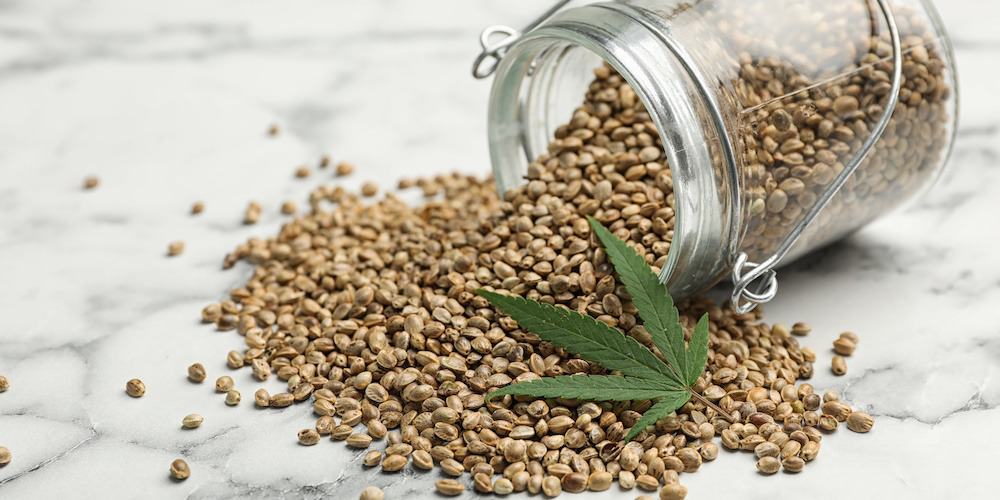BENEFITS OF HEMP
✓ Source of protein
✓ Protects the cardiovascular system
✓ Reduces cholesterol levels
✓ Antioxidant
✓ Relieves skin problems
What is hemp?
Hemp’s scientific name is Cannabis sativa. Native to Central Asia, it is a plant in the Cannabaceae family, like hops and recreational cannabis. However, it should not be confused with the latter, which is a psychotropic plant used for recreational or therapeutic purposes.
Indeed, hemp has a very low content of tetrahydrocannabinol (THC), the psychoactive substance of cannabis. Thus, it contains less than 0.2 % THC. The plant is therefore permitted to be cultivated, marketed and consumed in accordance with the French regulations.
Hemp is an annual plant that can reach up to 5 m in height depending on the variety. It has thin leaves and a deep taproot, complemented by numerous secondary roots.
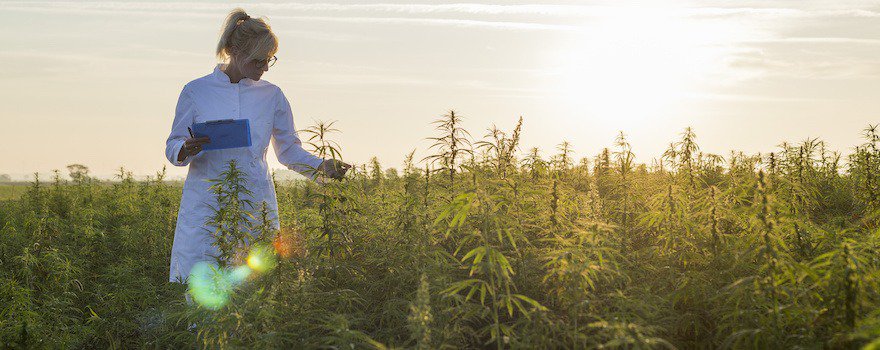
From late July to early August, hemp produces a beautiful bloom that attracts bees and pollinating insects. While the male plants wither and die, the female plants of Cannabis sativa produce a large quantity of seeds called hempseed.
All parts of the plant have a use. The rigid part of the stem, the hemp hurd, is used as a natural insulator, for making plasters and concrete. The flowers and leaves are used to obtain an essential oil recognized in aromatherapy.
Hemp fiber, for its part, has long been used in the textile industry to make clothing. It is even said to have been used by the Scandinavian Vikings to make their clothing.
From a medicinal point of view, hemp seeds are of particular interest. An excellent source of essential fatty acids (omega-3-6-9), they are also rich in protein, fiber, vitamins, minerals, and trace elements.
They can be eaten raw, as a powder, in beverages, or pressed to obtain oil.
Hemp seeds have many nutritional benefits and properties that are interesting for health. They are now offered as dietary supplements (capsules, tablets, powder).
In addition to being an excellent source of protein, they protect the cardiovascular system, reduce cholesterol levels, have antioxidant activity and relieve skin problems.
Nutritional composition
- 20 acides aminés dont les 8 essentiels
- Vitamines : provitamine A, B (B1, B2, B3, B6, B9), C, E
- Minéraux et oligo-éléments : calcium, sodium, fer, zinc, manganèse, magnésium, phosphore, cuivre
- Acides gras essentiels : oméga-3-6-9
- Polyphénols
- Protéines
- Glucides
- Fibres
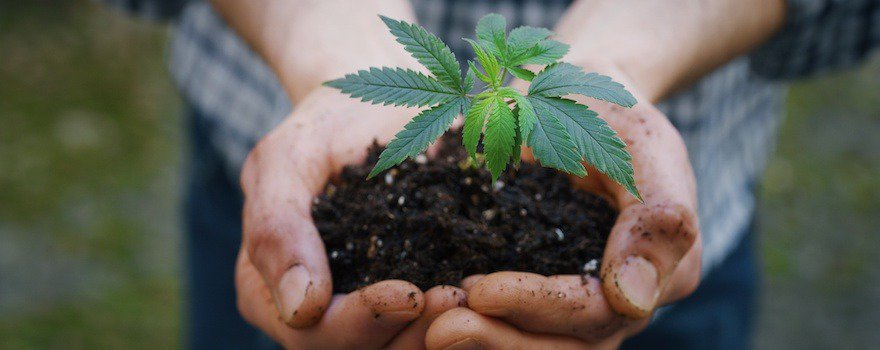
Benefits
1. Source of protein
Like chia seeds, hemp seeds are very nutritious. They contain, notably, a large amount of fiber (4 g per 100 g) and omega-3-6-9 (15 g per 100 g).
But hemp seeds are above all distinguished by their high content of proteins : 26 g per 100 g! Thus, they are among the 20 best plant proteins alongside spirulina and moringa. Hemp seeds are therefore ideal for replacing animal proteins as part of a flexitarian, vegetarian, or vegan diet.
Half of its proteins are complete proteins, meaning that they contain all the essential amino acids necessary for the body’s functioning. Hemp seeds are particularly rich in cystine, methionine, and arginine.
We also find 2 types of proteins: edestin, also present in the seeds of legumes, and albumin. Edestin is a highly digestible protein that participates in many biological functions: production of antibodies, hormone synthesis… Albumin, for its part, is a soluble protein produced by the liver. It ensures the transport of important elements in the blood and stabilizes blood volume, that is, the total volume of blood circulating in the body.
This review from the University of Kuopio (Finland) looked at the nutritional composition of hemp seeds.
2. Protects the cardiovascular system
In various scientific studies, hemp seeds have been shown to be beneficial for cardiovascular health.
Hemp seeds notably contain arginine, an essential amino acid. By activating the production of nitric oxide, it improves blood circulation, prevents the formation of clots, and dilates blood vessels. Hemp seeds are therefore particularly useful for preventing atherosclerosis (damage to the arterial walls of the heart), coronary artery disease, thrombosis…
Moreover, arginine helps reduce high blood pressure, one of the main risk factors for cardiovascular diseases. It also has beneficial effects on inflammatory markers, such as C-reactive protein (CRP), whose elevated level is linked to an increased risk of heart disease.
Hemp seeds also contain large amounts of omega-3 (alpha-linolenic acid) and omega-6 (linoleic acid). These essential fatty acids protect the heart, help prevent cardiovascular diseases, help control blood pressure and triglycerides, and improve vascular function.
Finally, hemp seeds contain vitamins, minerals and trace elements good for the heart such as B-group vitamins (B1, B3, B6, B9), vitamin C, vitamin E, calcium and magnesium.
This study from the University of Manitoba and the Institute of Cardiovascular Sciences (Canada), conducted on rats, shows the beneficial effects of hemp seeds on cardiovascular health.
3. Reduces cholesterol levels
Hemp seeds are a very interesting superfood in cases of hypercholesterolemia. They contain many nutrients that help reduce levels of bad cholesterol (LDL cholesterol) while stabilizing or even increasing the level of good cholesterol (HDL cholesterol).
On one hand, the soluble fibers capture fats from the blood, such as cholesterol and triglycerides, and facilitate their elimination. On the other hand, the seeds have a balanced ratio of omega-3 and omega-6, valuable for removing bad cholesterol.
This study from Konkuk University (South Korea), conducted on flies, shows how intake of hemp seeds reduces cholesterol levels and inhibits its absorption.
4. Antioxidant
Hemp seeds also exert an antioxidant effect. Thus, they effectively fight free radicals and their damage to cells and tissues.
Some hemp varieties, such as the Finola cultivar, are particularly rich in polyphenols and quercetin, antioxidant compounds. They inhibit the oxidation of beta-carotene by free radicals and the activity of the peroxyl radical (RHO 2).
The antioxidant action of hemp seeds is complemented by vitamin C (500 mg per 100 g), which fights the formation of free radicals, as well as provitamin A and vitamin E.
This study from the University of Messina (Italy), conducted directly in the laboratory, highlighted the antioxidant compounds of hemp seed oil from the Finola variety.
5. Relieves skin problems
Its seeds are also valuable for improving skin problems such as atopic dermatitis, psoriasis, or eczema.
Thanks to its high content of essential fatty acids, it reduces skin dryness and itching. Some of its vitamins also contribute to the beauty and health of the skin. Provitamin A (beta-carotene) promotes cell renewal, vitamin C contributes to collagen production, and vitamin E slows skin aging.
Finally, hemp seeds contain zinc (9.9 mg per 100 g), very useful in the case of a skin issue such as acne.
This study from the University of Kuopio (Finland), conducted on patients with atopic dermatitis, shows how hemp oil improved their symptoms.

How to consume hemp ?
Whole or hulled seeds
You can find hemp seeds whole or hulled — that is, stripped of their shell. Whole seeds have the advantage of being richer in fiber since a large part of hemp’s soluble fiber is found in the shell. Hulled seeds, on the other hand, contain more protein and omega-3-6-9.
Whatever your choice, hemp seeds can be eaten as is, toasted, as a snack, sprinkled over salads, yogurts… They can also be ground to make a delicious gluten-free flour.
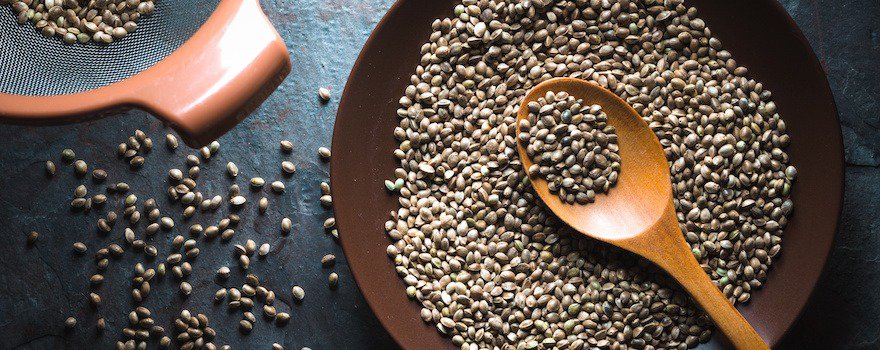
In capsules
Hemp is also offered in the form of softgels or capsules containing hemp seed oil from Cannabis sativa. It’s an interesting format because it’s rich in active compounds and easy to take. Hemp capsules also have the advantage of being tasteless.
To make the most of hemp’s benefits, choose capsules that contain enough oil (at least 500 mg per capsule).
In oil
After harvest, hemp seeds are pressed to extract all the oil. The result is an oil that’s interesting to use in cooking for its nutritional qualities and its light hazelnut flavor. Hemp oil is more of a dressing oil than a cooking oil.
You can also use it in your beauty routine to help with skin issues or to care for dull or damaged hair. Preferably choose a virgin oil, 100% pure, natural and cold-pressed.
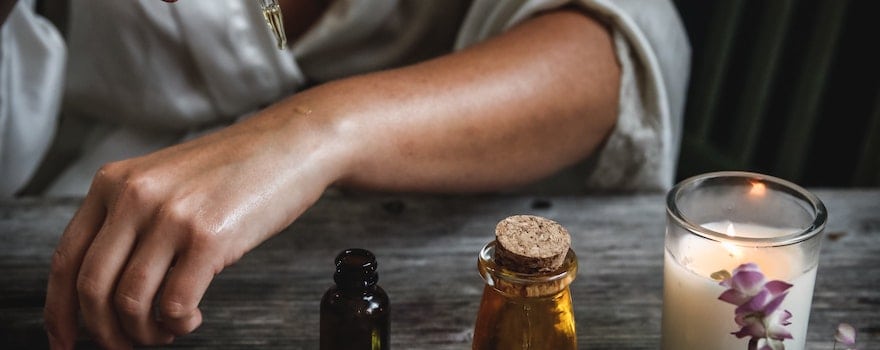
As a powder
Hemp seeds can also be ground into a powder. The hemp seed powder mixes easily with plant-based milks, smoothies or juices. You can also add it to your salads, soups, yogurts, breads, desserts and pastries.
This powder should not be confused with the hemp protein powder. When the hemp seeds are ground to extract the oil, the powdery residues are recovered and then milled into a fine powder : hemp protein. It is valued for its high protein content and excellent digestibility.
Hemp milk
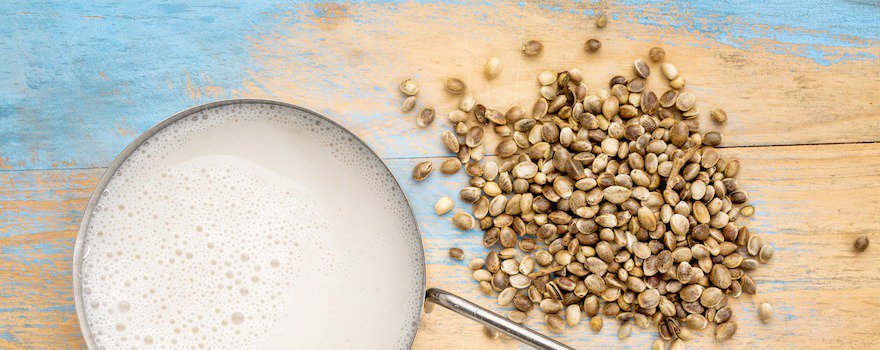
Hemp milk is a plant-based beverage made from ground hemp seeds and water. It is ideal for people suffering from lactose intolerance. In addition, it is gluten-free and very easy to digest.
You can make your own hemp milk at home. To do this, soak 150 g of hemp seeds in 1 L of water for 2 hours. Then blend the mixture until smooth. Strain everything, then sweeten the resulting drink with honey or a pinch of lucuma powder (Pouteria lucuma).
Hemp and CBD
Today, whether in nutraceuticals or cosmetics, products containing CBD (cannabidiol) are proliferating. This molecule found in hemp and cannabis is said to have anti-stress potential (but is not psychotropic like THC).
Although the legislation surrounding these products is more relaxed in the United States, their use is strictly regulated in France: only certain hemp varieties may be exploited, the use of leaves and flowers is prohibited, and any therapeutic claims are forbidden.

Hemp and medicinal plants
To improve cardiovascular health, hemp pairs well with açai (Euterpe oleracea) which protects the heart thanks to its anti-cholesterol properties.
To optimize bowel transit, it may be helpful to combine hemp seeds, already rich in fiber, with chia seeds or psyllium (Plantago ovata).
Sustainable consumption: prioritize organic, fair-trade, and local hemp
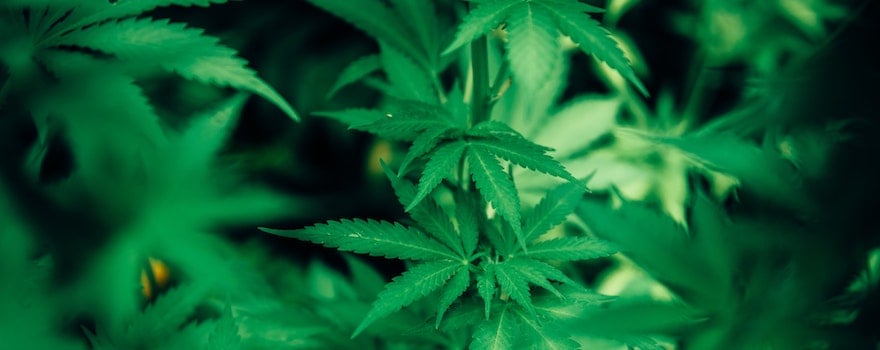
✓ Aujourd’hui, on le cultive majoritairement en Chine, en France, en Corée, en Espagne et au Chili. Face à la demande grandissante, de nombreux producteurs français se sont lancés dans la culture du chanvre. Les acteurs de la filière sont regroupés au sein de la FNPC (Fédération nationale des producteurs de chanvre). C’est la plus grosse filière européenne !
✓ To support local production, we recommend choosing hemp grown in France. Prefer hemp from organic agriculture, non-GMO and grown without chemical fertilizers, pesticides and insecticides. The fair-trade sector also helps support small producers and their work.
Dosage
⚖️ It is recommended not to consume more than 3 tablespoons of hemp seeds per day (between 20 and 30 g). We advise starting with small doses and then gradually increasing your consumption according to the effects felt.
⌛️ Doses should preferably be taken in the morning, on an empty stomach.
🥄 As seeds : 1 to 3 tablespoons per day.
💊 In capsules : up to 3 per day for 475 mg capsules.
🥃 In oil : 1 tablespoon per day.
🥄 As powder : 1 teaspoon per day.
Contraindications and side effects
Hemp consumption presents certain contraindications:
- Par mesure de précaution, les jeunes enfants, les femmes enceintes ou allaitantes doivent éviter de prendre du chanvre.
- Les personnes allergiques aux fruits à coques doivent également éviter d’en consommer.
- En raison de leur action sur la coagulation sanguine, on déconseille les graines de chanvre aux personnes prenant des médicaments anticoagulants.
Excessive hemp consumption can lead to the following side effects :
- Troubles digestifs
- Diarrhée
- Allergies
If you experience side effects, stop your consumption and consult a doctor.
History, cultivation, and market
Hemp has been used for centuries in the manufacture of ship ropes, as well as in textiles and paper. The first Bible printed by Gutenberg in 1456 was on hemp-based paper.
We are discovering today that this plant is also useful for biodiversity. Indeed, according to this study, hemp flowers play an important role in protecting bees by providing them with a sustainable food source.
Many species of bees are attracted to this nectar. Like spirulina, considered a nutritional substitute for pollen, it could be a possible response to their decline.
Hemp also attracts other insects, such as butterflies, but also birds which find an excellent source of protein there. That’s why its seeds are often incorporated into bird seed mixes.
From the textile sector to food, paper, biodegradable plastic, biofuels and biodiversity, hemp has exceptional potential, especially since its cultivation requires little water and the plant is very resilient.
Report produced by Julia Perez and Charlotte Jean
Sources and scientific studies
J. C. Callaway, 2004. Hempseed as a nutritional resource: An overview.
G Skoglund, M Nockert, B Holst, 2013. Viking and Early Middle Ages Northern Scandinavian Textiles Proven to Be Made With Hemp.
Delfin Rodriguez-Leyva, and Grant N Pierce, 2010. The cardiac and haemostatic effects of dietary hempseed.
Min Jung Lee, Seung Hwan Park, Ju Hua Han, Yoon Ki Hong, Soojin Hwang, Soojin Lee, Darae Kim, Seung Yeop Han, Eun Soo Kim, and Kyoung Sang Cho1, 2011. The Effects of Hempseed Meal Intake and Linoleic Acid on Drosophila Models of Neurodegenerative Diseases and Hypercholesterolemia.
Antonella Smeriglio, Enza M Galati, Maria T Monforte, Francesco Lanuzza, Valeria D’Angelo, Clara Circosta, 2016. Polyphenolic Compounds and Antioxidant Activity of Cold-Pressed Seed Oil From Finola Cultivar of Cannabis Sativa L.
James Callaway, Ursula Schwab, Ilkka Harvima, Pirjo Halonen, Otto Mykkänen, Pekka Hyvönen, Tomi Järvinen, 2005. Efficacy of Dietary Hempseed Oil in Patients With Atopic Dermatitis.
C.O’ Brien, H.S.Arathi, 2019. Bee diversity and abundance on flowers of industrial hemp (Cannabis sativa L.).


